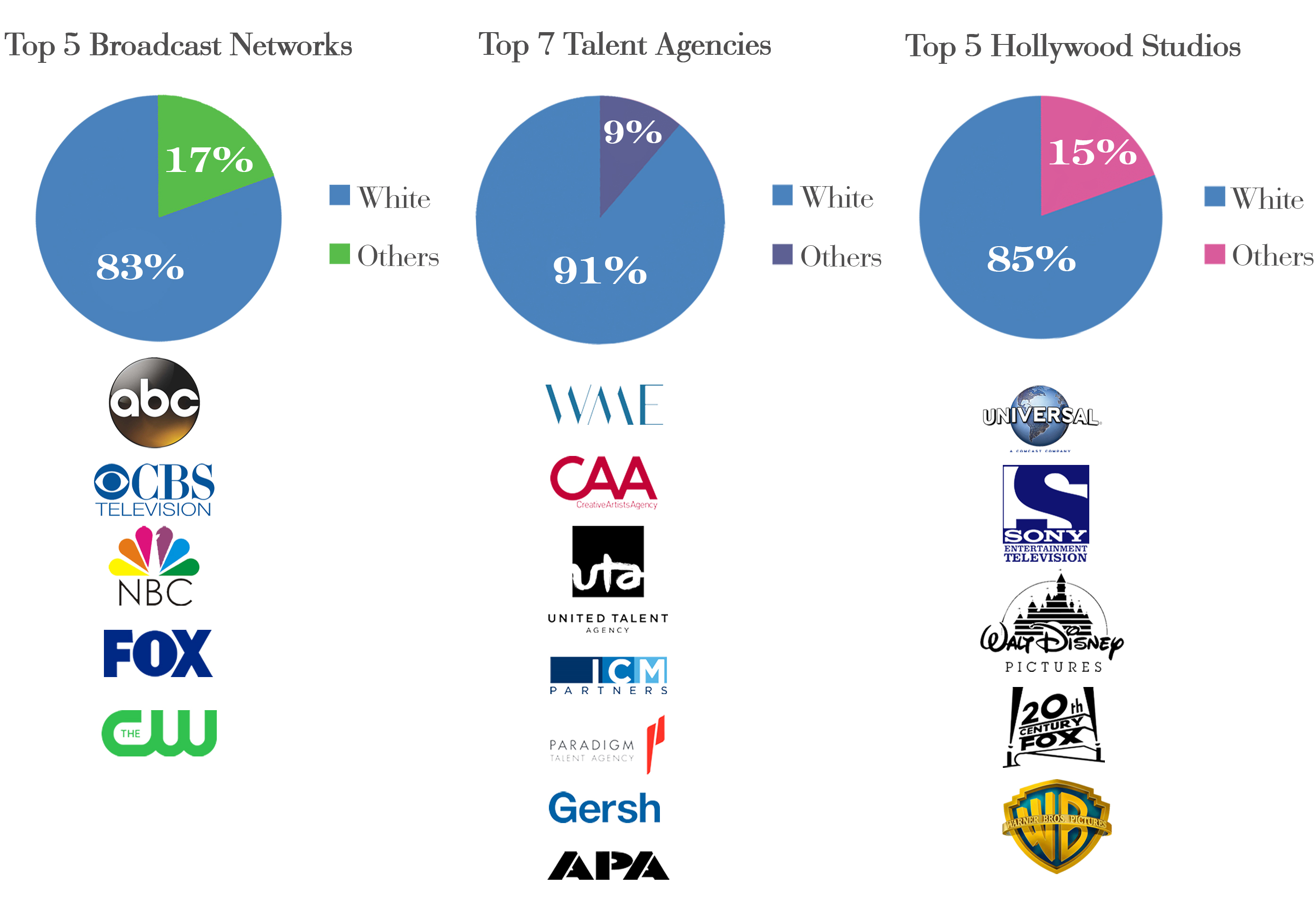SYSTEMIC RACISM IN HOLLYWOOD EXPOSED
By the Numbers: An in-depth breakdown into the racist hiring practices of “white-only” elites who control employment within Hollywood, including a detailed employee list of names (studio and film executives, talent agents and studio heads) proving non-whites are virtually shut out from being hired within this industry.
 By CHRISTINE MAGDALENE September 5, 2017
By CHRISTINE MAGDALENE September 5, 2017
I.
Recently I read two articles about racism in Hollywood that disturbed me enough to dive into personal project for which I had no intention to share. But given the heightened state of the country’s political atmosphere, it seems fitting to shed light on why these articles do not accurately reflect what’s really going on in Tinsel town and how these perspectives are damaging to all minorities who want to break into the film and television industry.
The first article by Richard Finger entitled Racism in Hollywood – Let’s Look at the Facts elaborates on the perceived racism in Hollywood and closes with, “Accusations of prejudice to sully the Academy of Motion Picture Arts validated by zero hard evidence and only fantasy discredits all involved”. The problem is the author never provides any data to support his conclusion and misleads readers to believe it's entirely based on facts given the very title of the article. Mr. Finger, a white male, sites specific achievements of famous African Americans in the film and television industry and thus deems racism can’t possibly exist in Hollywood. He clearly fails to identify the "diversity waves" within this dynamic structure and is oblivious to the systemic racism that pervades all around him.
Ironically the second article is from an interview featuring one of Hollywood's black success stories, Mr. Tyler Perry; a prime example of Mr. Finger’s conclusion no doubt. Mr. Perry talks about various topics throughout the interview including racism in Hollywood and when asked if he thinks Hollywood respects the African American audience he replied, "...I don't think Hollywood is black and white, I think it's green... it's all about the money... making the money is where the respect is going to be." Unfortunately, Mr. Perry fails to see the oil that runs the machine is white privilege. And although he and Mr. Finger are a different race, they have the same face.
II.
To address the multifaceted problems that exist within this dynamic structure, we need to analyze the deeper issues of multilevel racism and tackle it from different angles.
According to the July 1, 2016 U.S. Census, a little over 60% of the United States population identify as "white-only" which leaves nearly 40% who identify as other races. Although the minority population is on a steady rise, Hollywood has chosen to ignore reality. And as television viewership increases, so does demand for diverse content since people like to see a reflection of themselves on screen. Sadly, broadcast networks have yet to figure out how to use this demand to their advantage. But with fierce competition from premium cable and streaming services, network executives are forced to face the fact that their formulaic structure no longer works for the masses. Audiences are tired of the same types of shows rehashed over and over again simply presented in different packaging. They want to see different kinds of stories told by screenwriters from all backgrounds.
The truth is, the art of choosing new scripts from skilled, talented and hardworking screenwriters has been replaced with nepotism, favoritism and "personal relationships" resulting in run-of-the-mill programming. Executives have yet to adapt a more structured format to include new, innovative and creative projects due in part to their failure to hire qualified diverse talent both in front of and behind the camera. On top of that, it appears there is no 'checks and balances system' within their hiring structure. Hiring is limited to friends, relatives and other factors not necessarily based on potential and ingenuity; "relationship-building" overrides skill and talent because employment is based on "choice" instead of the traditional method of creative proficiency and capability to perform.
The film and television industry is a club of sorts, a club for people with the right skin tone. This choice-hiring method clearly and systematically reveals vast exclusions of minorities, allows the legal right to discriminate and is disadvantageous for those most vulnerable creatives looking for a way into the industry since no one wants to befriend dissimilar outsiders. But if there were a clear path to entry starting from the top, there wouldn't be such a high racial disparity. These discriminatory hiring practices are clearly racially biased and need to be checked.
Sports, music and other creative arts require skill, talent and hard work that lead to direct pathways for all who qualify. However, this is not the case within the film & television structure and the rigmarole leaves many talented screenwriters specifically minorities, completely shut out of the industry. And it's been this way for a very long time, so when will it change? Sure, diversity waves appear every so often, a little wave here a little wave there but the ocean is still white. To be specific, the current wave includes shows like Scandal, Black-ish, How to Get Away with Murder and Empire but this trend won't last long because it's just that, a trend. And let's not overlook the lack of Hispanic, Asian, and other minorities who at many times have been left out of this conversation entirely. On a larger scale, we've been here many times before, don't you remember? How long must we protest before action is taken? The fact is every few years Hollywood catches the diversity wave but shortly thereafter goes right back to white-washed programming.

III.
It's time to end the diversity wave and in order to do that the whole system needs to be transformed from the inside out. This transformation starts from the top and works its way to the bottom. Informed individuals should pull the uninformed folks aside to enlighten and educate them on why the system needs a complete overhaul. This is done by showing them the data and statistics which illustrate systemic racism permeates throughout Hollywood on many different levels:

These are the facts; the numbers don't lie. Is Hollywood Racist? Yes, at least within the framework of broadcast network. And I for one have no doubt the results will be the same when you collect and gather statistics on basic and premium cable television executives, support staff, casting agents, talent managers, entertainment lawyers, film producers, below-the-line crew, and other film executives. These numbers are disappointing to say the least but there are viable solutions. To reiterate, diversity waves must end.
The above statistics illustrate the need for a long-lasting solution to permanently dismantle the existing racist structure.
The top seven agencies, WME, CAA, UTA, ICM, Gersh, Paradigm, and APA that represent above-the-line talent consists of 833 agents combined of which over 90% are white. These agents support and promote predominately white talent. The top five broadcast networks ABC, CBS, NBC, FOX and The CW, including executives and support staff total 150 combined of which nearly 85% are white. These are the key decision-makers who push white-washed programming. The top five Hollywood studios, Universal, Sony, Disney, 20th Century Fox and Warner Brothers, have a staff of 184 combined of which 85% are white.
Based on these numbers alone, executives in charge to green light TV shows are nearly all white; executives who fund productions are nearly all white and agents who pick and choose talent are nearly all white. And there appears to be a shortage of decision makers willing to take the risk to properly develop and train a mixed group of talent in order to qualify them for proper employment within the industry.
Evidently the problem is systemic and thus the solution must be systematic.
Integration should begin at the very top; hire a diverse team of network executives, then restructure at the executive studio level. Adopt a version of the NFL's Rooney Rule and require network and studio executives to interview minority candidates for senior positions as they become available. Require a direct pathway for network executives to hear pitches from unrepresented yet talented minority screenwriters. Hire a wide range of television producers and train to employ a multicultural group of talent agents. Incorporate a hiring program at Hollywood's top talent agencies specifically designed to educate and train minorities for employment as talent assistants and agent trainees with an end goal to increase representation for a variety of talent.
IV.
These are just a few ways to help resolve the key issue and it should start with opening the doors to capable screenwriters since they are the backbone of the film and television industry.
I've personally teamed up with a few industry professionals to create an original training program that aids in the process of identifying a qualified and diverse pool of screenwriters.
The bottom line is, once the industry fixes these abysmal statistics, the main problem will finally be resolved with the help from those on the inside who see the problem for what it is, call it out and put in the effort to make the necessary changes. Unfortunately, these individuals are few and far between.
As the United States becomes increasingly more diverse, audiences want to see this reflected on their television screens and there's no denying the many ways to accomplish this task. Systemic racism in Hollywood clearly exists and it's blatantly evident by reviewing the statistics however, as inclusion becomes common practice, diversity waves will no longer exist because the system will adjust accordingly. It's in the best interest of the film and television industry to move towards a more progressive path and direction that accurately reflects the increasingly colorful United States population which craves diverse content. ♦
Christine Magdalene is a writer, director and activist attached to Plucky Films, a film and television production company based out of New York City.
Primary Research Collected: U.S. Census Bureau, LinkedIn, IMDBPro, Twitter, The Hollywood Reporter, Variety, Deadline, The Wrap, Getty Images, Zimbio, WireImage, Google/Internet search of 1,894 film & television industry professionals in Los Angeles and New York who represent above-the-line talent in Hollywood as of September 5, 2017. After the original list was cross-referenced, the final number in this report totals 1,167 working film & television industry professionals.